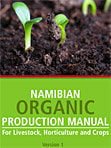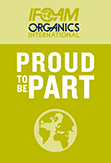DIY Composting Course
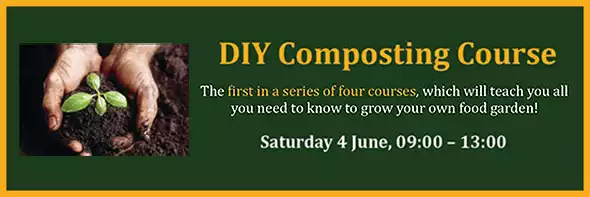
The first in a series of four courses, which will teach you all you need to know to grow your own food garden.
Saturday 4 June, 09:00 - 13:00
Who should attend?
Anyone interested in organic gardening and a healthy lifestyle!
In this down-to-earth, hands-on course, we'll be covering the theoretical and practical side of composting. After basic theory on hot, cold and vermi-composting, we'll get straight into the action, where you'll learn to select the right compost for your garden/living situation and how to successfully build and maintain it.
The course will be facilitated by permaculturalist and botanist Fabian von Hase. He is passionate about everything, and his life's mission and dream is to see a return to wholesome, natural living.
The four courses are:
1. Composting
2. Soil management (no-dig gardening, companion planting, mulching, etc.)
3. Seeding, repotting and selecting the right plants (including medicinals)
4. Working with pests and weeds in an organic way
(Dates to be announced)
Coffee, tea and snacks will be provided.
The course fee for the first course will be N$550.
To register or be added to Fabian's mailing list, email to vhasefabian@gmail.com or SMS 081 3971 924.
Soil Management Course
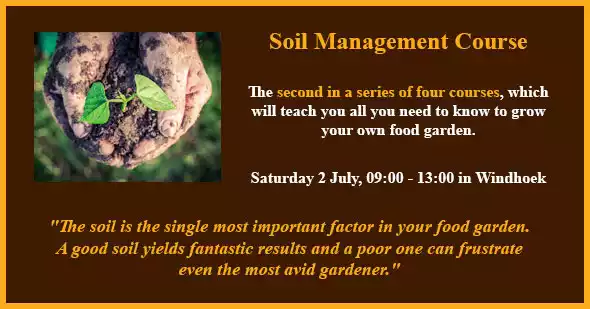
The second in a series of four courses, which will teach you all you need to know to grow your own food garden.
Saturday 2 July, 09:00 - 13:00 in Windhoek
"The soil is the single most important factor in your food garden. A good soil yields fantastic results and a poor one can frustrate even the most avid gardener."
Soil Management Course
Saturday 2 July, 09:00 - 13:00 in Windhoek
The second in a series of four courses, which will teach you all you need to know to grow your own food garden.
Who should attend?
Anyone interested in organic gardening and a healthy lifestyle!
In this immersive course, The course will be facilitated by permaculturalist and organic enthusiast Fabian von Hase will teach you all you need to know about the life of the soil, respectful no-dig gardening, mulching and much more, so that you can create your own beautiful and productive garden soil.
The course fee for the Soil Management Course is N$550. To register for the course send an email to vhasefabian@gmail.com. Coffee, tea and snacks will be provided.
Register for all 3 upcoming courses and receive a 10% discount on the course fees. The courses build on each other and are as follows:
1. Composting - 4 June (this course took place already - if there is enough interest the course will be repeated)
2. Soil management - 2 July
3. Seeding, repotting and selecting the right plants (including medicinals) - 23 July
4. Working with pests and weeds in an organic way - 6 August
(Dates to be announced)
The combined fee for three courses is N$1650. Registration for all courses before 2 July will save you N$170; you pay only N$1480.
If you wish to be added to Fabian's mailing list to stay informed about upcoming courses, please send an email with "add me to your mailing list" to vhasefabian@gmail.com.
NOA at the 2016 Tourism Expo
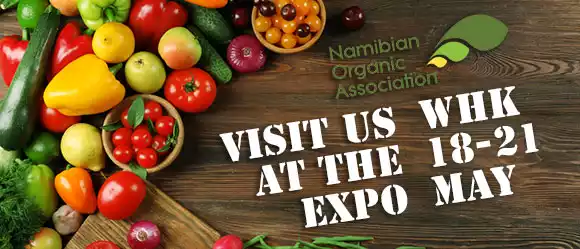
Find out about NOA and Namibian organics at the Namibian Tourism Expo. 18-21 May at the Windhoek Show Grounds, We're looking forward to meeting you.
You can find us in the Culinary and Organic Hall.
Find a map here...
NOA Course 2017: Introduction to Organic Vegetable Growing
NOA Course: Introduction to Organic Vegetable Growing
The Namibian Organic Association (NOA) invites you to attend an Introduction to Organic Vegetable Growing course on Saturday, 4 November 2017.
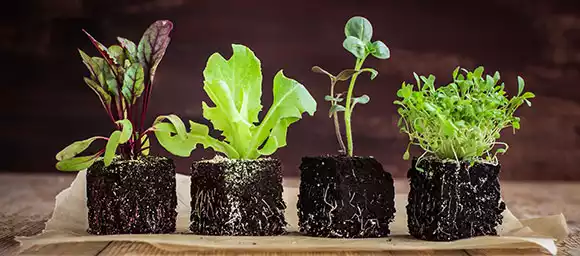
The Namibian Organic Association (NOA) invites you to attend a training course on basic composting techniques, earthworms and using effective micro-organisms to improve your soil and plant health.
The course will be held in Okahandja, starting at 7:30 for 8:00 am and finishing at 13.00 pm.
During the course you will be introduced to:
- How to prepare and manage compost
- Using effective micro-organisms to improve the soil and plant health
- Recycling garden and kitchen waste
- How to make an earthworm farm
- Growing your own seedlings and planning your vegetable garden
- Drought management practices including recycling water from your bathroom and kitchen.
Who should attend?
Anyone interested in growing their own food.
The course will be a combination of theory and practicals, so please come in old clothes and be prepared to get dirty. Remember your hat and water bottle, plus notebook, pen and pencil.
The course facilitator is Manjo Krige, Co-founder and Chairperson of the NOA. Manjo has been working in organic agriculture and growing organic herbs and vegetables for twelve years.
The course fee is N$450.00 per person, including coffee, tea and an organic lunch.
Please book by Tuesday, 31 October 2017 by sending an e-mail to info@noa.org.na. Seats are limited.
NOA Organic Vegetable Growing Course
Introduction to Organic Vegetable Growing course.
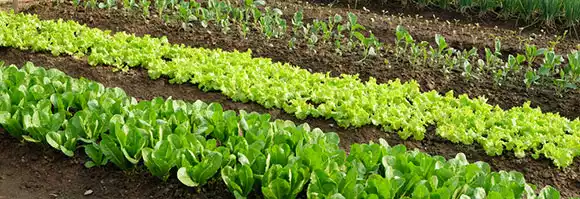
The Namibian Organic Association (NOA) invites you to attend an Introduction to Organic Vegetable Growing course.
When:
- Windhoek: Saturday 5 November 2016
- Okahandja: Saturday 12 November 2016
- Planting out your edible garden (flowers, herbs, vegetables, fruit trees and shrubs)
- Irrigation
- Soil management
- Using effective eicro-organisms
- Recycling garden and kitchen waste
- How to make an earthworm farm
- Making compost and solving some common problems
- Growing your own seedlings
- Pest and disease control
- How to manage weeds
- Drought management practices including recycling water from your bathroom and kitchen
Anyone interested in growing their own food. Garden workers are also welcome.
The course will be a combination of theory and practical’s, so please come in old clothes and be prepared to get dirty. Remember your hat and water bottle, plus notebook, pen and pencil.
The course facilitators are:
- Manjo Krige, Founder and Chairperson of the NOA. Manjo has been working in organic agriculture and growing organic herbs and vegetables for twelve years.
- Stephen Barrow who has been working with organic agriculture and Permaculture in the South Africa and internationally for twenty years. Stephen works internationally in organic certification, and offers consultancy and training in organic agriculture and Permaculture. Stephen has worked with Manjo for the past seven years, helping in the establishment of the NOA.
Spaces are limited, so please book your place soon to avoid disappointment! E-mail noacourses@gmail.com
Invitation to discussion on organic food
Please join the Namibian Organic Association and the FAO (UN Food and Agriculture Organisation) for a discussion on:
* your requirements for organic food
* availability
* quality
* prices
* perceptions
* ideas about sustainable agriculture practices in Namibia.
Moderators: Allison Loconto (FAO expert, Rome) Wiebke Volkmann (Consultant, Namibia), Manjo Smith (NOA, Chairperson)
Consumer Discussion
Morning Session
Date: 9 May 2015
Time: 9.30 to 11.30
Venue: Green Market Café, 3 Dr. Kenneth Kaunda St., Stephanus Church, Windhoek
Consumer Discussion
Evening Session
Date: 11 May 2015
Time: 17.15 for 17.30 to 19.00
Venue: Namibian Agronomic Board (Board room), 30 David Meroro Street, Windhoek
Background:
FAO selected a case study on the NOA PGS (Participatory Guarantee System (PGS) as one of 15 international studies to be included in the FAO “Study on innovations in linking sustainable agricultural practices with local markets in developing countries”.
NOA PGS is an organic guarantee system to certify Namibian producers for the local Namibian market. It embodies the active participation of producers, consumers and traders.
As the study illustrated a unique approach to agro-ecological practices, this year it was also selected to be part of the second study that examines market linkages of the PGS, and it will provide evidence on the diversity of markets used in the sales of agro-ecological products.
Please confirm your attendance by 7 May 2015 to intern@noa.org.na, and at which date you would like to join us.
We look forward hearing what you have to say.
The NOA Team
NOA Course 2016: Introduction to Organic Vegetable Growing
2016-03-06
NOA Course: Introduction to Organic Vegetable Growing
The Namibian Organic Association (NOA) invites you to attend an Introduction to Organic Vegetable Growing course on Saturday 19th March 2016.
The course will be held at Amani Development Centre, Windhoek, starting at 8.00 for 8:30 am and finishing at 17.00 pm.
During the course you will be introduced to:
- Some basic Permaculture Principles for garden design,
- Soil management,
- Using Effective Micro-organisms,
- Recycling garden and kitchen waste,
- How to make an earthworm farm,
- Making compost and solving some common problems,
- Growing your own seedlings,
- Planting out your edible garden (flowers, herbs, vegetables, fruit trees and shrubs),
- Irrigation,
- Pest and disease control,
- How to manage weeds,
- Drought management practices including recycling water from your bathroom and kitchen.
Who should attend?
Anyone interested in growing their own food.
The course will be a combination of theory and practical’s, so please come in old clothes and be prepared to get dirty. Remember your hat and water bottle, plus notebook, pen and pencil.
The course facilitators are:
- Manjo Krige, Founder and Chairperson of the NOA. Manjo has been working in organic agriculture and growing organic herbs and vegetables for twelve years.
- Stephen Barrow who has been working with organic agriculture and Permaculture in the South Africa and internationally for twenty years. Stephen works internationally in organic certification, and offers consultancy and training in organic agriculture and Permaculture. Stephen has worked with Manjo for the past seven years, helping in the establishment of the NOA.
The course fee is N$450.00 per person, including teas and lunch. There are sponsorships available to selected participants.
Please book by Tuesday 15th March by sending an e-mail to info@noa.org.na
Those wishing to apply for sponsorships must submit their motivation by the same date.
Course - Introduction to Permaculture
Introduction to Permaculture Course - November 2016
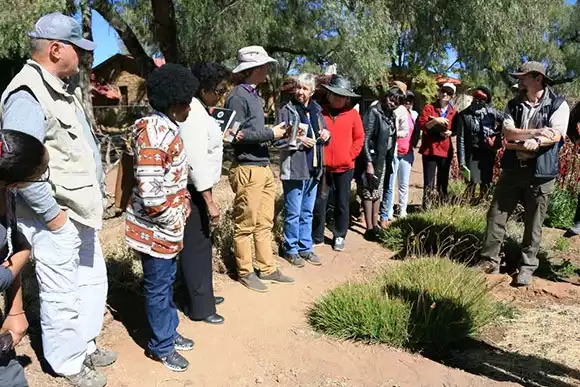
19 - 20 November | 09 - 16:00 & 09 - 13:00 | N$ 1700.00
The definitive, internationally recognised beginner’s course, this is an intensive introduction to the methods and principles of Permaculture. We will cover “What is Permaculture?”, its ethics and design principles and learn about methods of design and the concept of zones. All of this will be interspersed with regular hands-on practicals. This is a must-do course for all budding Permaculturists!
The course will be facilitated by Permaculturist and Botanist Fabian von Hase. He is passionate about everything green and his life’s mission and dream is to see a return to wholesome, natural living.
The course will take place at Farm Krumhuk, 20km South of Windhoek.
To register for the course, send an email to vhasefabian@gmail.com or sms to 081 3971924.
Permaculture Design Course in March
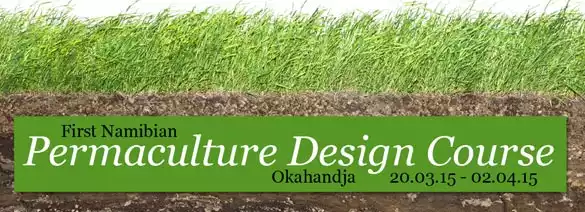
Join the Namibian Organic Association, as we walk with you on a life-changing, two week Permaculture Design Course.
Download the full course information here...
Download the course registration form here...
What is Permaculture?
The ultimate purpose of Permaculture (or “permanent culture”) is to develop a site until it meets all the needs of its inhabitants, including food, shelter, fuel, and entertainment. Bill Mollison and David Holmgren, two Australians, first proposed the concept of Permaculture in the mid 1970’s, an internationally accepted methodology taught in tertiary institutions.
Permaculture provides a means whereby individuals, groups and communities can empower themselves to develop sustainable human settlements, from deserts to the tropics, to rebuilding war torn communities - all based on proven ecological patterns and principles.
The course will follow the core Permaculture Design Curriculum, used internationally, covering design and practices for human environments, from homes right through to extensive wildlife areas. Using the Five-Rand Informal Settlement in Okahandja, for putting Permaculture into practice, participants will actively create their own Permaculture Designs for these two environments and implement some of the strategies.
Dates: 20 March – 2 April 2015
Venue: Okahandja (TBA)
Who should attend?
The course is appropriate for anyone who has the desire to design and practically implement resilient regenerative futures, and from all walks of life.
- People interested in design of sensible human and environmentally friendly habitats starting with our homes and rural communities
- People interested in growing their own food – in urban or rural settings
- Small-scale or large-scale farmers producing food for the formal and informal market
- NGOs supporting food security projects
- Extension officers, agricultural advisors, community helpers
- Gardeners
- Landscape architects
- Lodges and hotels
NOA at the Tourism Expo 2015
NOA at the Tourism Expo 2015

Join us at the Namibian Tourism Expo, 10 – 13 June 2015, at the Windhoek Show Grounds. We want to share all of NOA’s activities with you, and answer all your questions.
Visit us on the NOA stand in the Organic & Culinary Hall to:
- Find out how to recognise real organic food, produced according to organic standards
- Take a look at the new Namibian Organic Production Manual
- Find out how to visit organic farms and participate in annual organic farm assessments
- Sign-up and become a member
- Check out what resources we have available in the NOA library
TRADE DAY
Wednesday,10th June 2015:
15:00-22:00
PUBLIC DAYS
Thursday 11th & Friday 12th June 2015:
12:00-21:00
Saturday,13th June 2015
10:00-17:00
Please note: Gates close 1 hour prior to Expo closing times.
We are looking forward meeting you there!
NOA at COP 11
Organic Agriculture combats desertification
The Organic Agricultural Sector calls on the United Nations Convention to Combat Desertification (UNCCD) to encourage governments to adopt Organic Agriculture as a tool to combat desertification.
“Unsustainable agricultural practices is a major cause of desertification” said Manjo Smith, Chairperson of the Namibian Organic Association and world board member of IFOAM (International Federation of Organic Agricultural Movements), in her presentation, "Investing in our soils through environmentally‐friendly agriculture" during the Sustainable Land Management Business Forum at the UNCCD COP11 event.
Desertification is caused mainly by overcultivation, overgrazing, deforestation and poor irrigation practices, which result in organic matter loss, soil contamination, erosion, soil compaction and sealing, salinisation and long-term loss of natural vegetation” she explained.
Desertification leads to food insecurity, famine, poverty, and human displacement that can give rise to social, economic and political tensions, perpetuating the vicious cycle of poverty and land degradation.
In sharp contrast, Organic Agriculture is a holistic production management system, which enhances agro-ecosystem health, utilising both traditional and scientific knowledge. Organic agricultural systems rely on ecosystem management rather than external agricultural inputs such as the application of chemical fertilisers and the use of pesticides and herbicides.
The practice of Organic Agriculture increases the resilience of soils to both water stress and nutrient loss. It contributes to combating desertification because soil erosion and land degradation is prevented and helps to rehabilitate degraded land.
Additional benefits of Organic Agriculture are:
- building a fertile, living soil with frequent organic matter inputs, sustained soil cover, crop rotations and intercropping. Organic Agriculture farming systems that integrate crops and animals can reduce overgrazing and facilitate nutrient recycling on the farm;
- wind and water erosion of soils is prevented because of a better, more stable soil structure and texture, through persistent and diversified soil cover and agro-forestry;
- improved water infiltration and retention capacity because of high levels of organic matter and permanent soil cover such as cover crops or mulch, which substantially reduces the amount of water needed for irrigation;
- reduced surface and ground water consumption and subsequent soil salinisation because of increased water retention capacity, reduced water evaporation, and the creation of suitable and sustainable micro- climates in dry areas. This kind of water retention can result in diversified organic agro-forestry systems that can attract and retain atmospheric humidity; and,
- reduced ground and surface water contamination because the use of synthetic pesticides and fertilizers is discouraged, which protects the limited amount of water available in dry areas from pesticide contamination and nitrate and phosphate leaching.
Smith concluded, “Organic Agriculture should be a key component of programmes aimed at stopping land degradation processes and bringing degraded lands back into production. Governments, development agencies and donors should promote Organic Agriculture in their agricultural development efforts to reverse desertification where it has occurred and to prevent it from expanding.”



